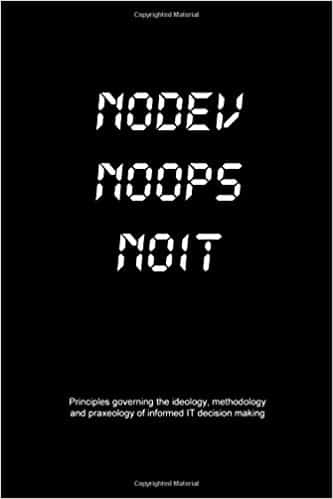I have to hand it to Scott. I loved this movie that he kept nagging me to watch.
Idiocracy takes place five centuries into the future, in a United States where Americans are idiots from dozens of generations of the least intelligent people breeding the most and the most intelligent being too cautious and responsible with their life choices to catch up in their own reproduction. Written and directed by the great Mike Judge (Beavis and Butthead, Office Space), it stars Luke Wilson and Maya Rudolph — two actors who amuse me greatly — whose characters have been frozen as part of a military experiment since the early 21st century, and who, through a fluke, do not reemerge from their cryrogenic slumber until a good half a millenium later.
In this dystopian future, all beloved television programming and films are little more than gastronomical jokes and repeated shows of testicular injury. Everyone is a moron. Wilson’s character, who was chosen by the military for being perfectly, extraordinarily average (rounded out with an even 100 IQ), is soon found to be the most intelligent person alive in this future world of imbeciles.
The thing that struck me about this ridiculous comedy was how frighteningly close it hit home. In today’s America, with Fox News being the source of current events information for tens of millions of the more “serious” people, and pop culture becoming ever more two-dimensional and geared toward those with low attention spans, America’s fate in Idiocracyseems all too plausible. Of course, much of the movie is outright absurd, but it does encapsulate what it is that many Americans seem to want more than anything else: immediate pleasure, carnal, visual and auditory, with little regard for the future. In Idiocracy it is even worse as everyone’s time preference seems nearly infinitely high, and so economic progress has reversed itself and the average person’s standard of living seems no better than today, except that the fast food industry is even more ubiquitous, reclining chairs are equipped for disposing of human waste without having to stand up and move, and no one really expects very much from his fellow man.
What we see in Idiocracy is, whether or not Judge intended it, a very good model, however hyperbolic and satirical, of the therapeutic corporate state. First, it is worth reflecting on the corporatist aspect.
Some libertarians might find the movie a cheap shot on capitalism, but insofar as it is, it is not the free market version being attacked. The film takes place where corporation and state have become so mixed as to be indistinguishable. Carl’s Jr. runs the courts and police. A sports drink company has lobbied to have all crops fed with its product, rather than with water, causing huge agricultural disaster throughout the country—reminding this viewer of FDR’s nationalization of agriculture and the subsequent relationship of pork and privilege between Big Ag and the state, none to the net benefit of the taxpaying consumer. The movie’s characters live a hand-to-mouth existence, barely scraping together enough money to eat the fast food fries that, for many people, seem to be a major reason for existence.
But this cannot be the result of the market alone. The state, and the culture, have intertwined big business into the legal system and the prevailing ethos of civilization itself. The prisons are “private”—but, just as with today’s privatization of prisons, the overbearing coercive state apparatus has not been the least bit stripped away. And libertarians should oppose contracting out illegitimate state functions, whether today or in the 2500s.
In the 2500s, Costco is as large as a city. Could this be a result of the eminent domain that Costco is particularly famous for exploiting? Inside its walls, among many other services, you can get a legal license—another institution of state monopoly. Interesting that in the future, fast food is simply as integrated with the state as many licensed occupations are today. And thus is the entire economy in this movie the model of social fascism—the Big-Business-Big-Government corporate state.
Meanwhile, the people do not fundamentally question the system, because all they care about is the next bit of sensory excitement. Like creatures in a Skinner Box, the inhabitants of this stupified United States are happy so long as they have their sports drink, their taco, their handjob from Starbucks (a sexual service provider in the future), or their spectacle of state-sponsored circuses, complete with gladitorial combat. All they want is a bit of stimulation, a bit of soma, to get through their meaningless lives.
This part of the dystopia is what libertarian great Thomas Szasz has referred to as the therapeutic state—a leviathan that provides, forbids and regulates various pharmacological and other forms of mental processes on the part of its subjects—a system that, on a more fundamental level, judges individuals on the basis of what purportedly exists in their minds, rather than their actual actions or crimes (in Idiocracy, speaking eloquently is seen as “gay” and such speech elicits coervice, and systematic, social sanction).
The nightmare state of the future does not ban sex and intoxiants, but rather doles them out regularly, and encourages its citizens to stay compliantly satiated by momentary bursts of stimulus.
In America, this is actually more in accord with the realistic vision of the authoritarians than is the leftwing’s fear of a puritanical theocracy, as depicted in V for Vendetta (a movie I nevertheless loved), or the rightwing’s fear of total socialism and the full destruction of money and markets. Among libertarians who fear the religious right or attacks on corporate America more than anything, this movie is a good show of a more likely, more centrist, more American totalitarianism—a totalitarianism that still recognizes, as does this film, that the average dimwit really does love “money and sex”—a massive corporate state, where Big Business is everywhere, and the business-state nexus is principally concerned with keeping its subject-clients dependent and unresistant with an array of flashy modern-yet-stagnant technology, a special-effects-laden public sphere, regular doses of greasy bread and regular installments of sensationalist circuses.
Big Pharma ain’t going anywhere, whether the Republicans or Democrats win in 2008 or 2012 or 2016. Neither will Big Ag. The Therapeutic Corporate State is here, and if Americans don’t wise up, the future will be no less dreary, and the people no less acquiescent, than what we see in Idiocracy.















